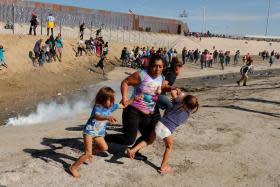International migrants day: As Trump vows to build the wall - here's how you can help people in the migrant caravan
The United Nations’ International Migrants Day arrives this year amid a controversial crackdown on immigration across the US-Mexico border and Donald Trump's push to build a wall along it.
The president has threatened to shut down the federal government if lawmakers don’t provide $5bn for his campaign promise of building the wall. Meanwhile, caravans with thousands of asylum-seekers have found themselves in limbo just outside of the nation’s borders.
Thousands of migrants have also been detained by US authorities after crossing into the country, many of those seeking asylum from violence, gangs, starvation and persecution in Latin American countries.
Their plight has become a focus for progressive lawmakers and activists alike, who argue the US has not done enough to support economic stability and quality of life in Mexico, Central America and South America.
Below are just a few ways to support refugees and asylum-seekers travelling with the migrant caravans.
Read more
California considers suing Trump administration over tear gas incident
Donate
There are an entire slate of human rights and migrant advocacy groups travelling with the caravans throughout Latin America, providing resources and humanitarian aid to those making the arduous journeys.
UNICEF has partnered with the Mexican government to provide hygienic and sanitation necessities to the caravans crossing through the country. The organisation is also reportedly providing psychosocial support and training required for local authorities to better assist children.
Save the Children has also launched a Border Crisis Children’s Relief Fund that provides legal counsel and family reunification services to those who may have been separated from their loved ones, along with other emergency services.
Amnesty International Americas has also been monitoring the caravans and the overall health and safety of the thousands of migrants who have been making their way towards the US. The organisation is also working with local authorities on how they can better respond to the influx of migrants.
Volunteer
In many cases, migrants seeking asylum are admitted into the country and dropped off at bus stations with no clear direction or assistance from the US government towards reaching their next steps.
Groups like RAICES and the Interfaith Welcome Coalition visit those buses every week, supplying thousands of migrants with emergency resources and preparing them for the next chapter of their lives.
The Independent covered a recent trip RAICES took to the San Antonio greyhound bus station in Texas, where migrants received legal aid, backpacks of food and water and a set of directions on how to get to their families after arriving to the US.
These organisations are always seeking new volunteers, many of whom live in border states as well as others who travel from across the country to help provide resources.
Advocate
Advocacy groups are speaking out against the White House administration’s hard-line approach to immigration along the US-Mexico border, including the rise of migrants being held within detention centres as their asylum proceedings are underway.
Faith-based groups like the American Friends Service Committee have organised massive demonstrations to raise awareness for the plight of migrants travelling in caravans. More than 300 religious leaders from mosques, churches and synagogues came together in California near the border of Tijuana for a demonstration on Monday as part of the group’s national week of action titled, “Love Knows No Borders: A moral call for migrant justice.”
Support free-thinking journalism and subscribe to Independent Minds
Americans who wish to speak out against the administration’s approach to dealing with the immigration crisis along the border can also write to their elected officials through the US House of Representatives website.
Educate
The president and others have helped spread false claims surrounding the migrant caravans that may adversely impact those refugees and asylum-seekers as they push for assistance from the US after reaching the country.
Mr Trump has repeatedly claimed the caravans were filled with “criminals” and possibly even members of ISIS — despite reports from a range of nonpartisan groups, media outlets and human rights organisations confirming the vast majority of travellers are innocent women, children and men fleeing violence.
By informing and educating oneself on the issues migrants are facing in their home countries and why they have chosen to make these journeys in large groups — the thousands of travellers have said they are much safer than when travelling alone or with the help of drug cartels, who regularly smuggle migrants into the US — it is easier to have conversations with others about those facts and push for change on a societal level.

